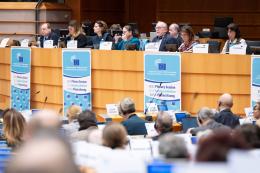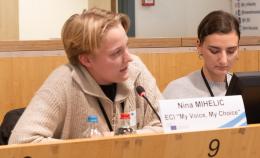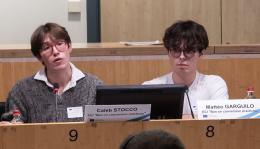European Economic
and Social Committee
Main navigation
-
Eolas faoi CESE
ABOUT
The European Economic and Social Committee (EESC) is the voice of organised civil society in Europe.
Find out more about its role and structure at http://www.eesc.europa.eu/en/about
- EAGRAÍOCHT PHOLAITÍOCHTA
- COMHAR RIARACHÁIN
- COMHAR LEIS NA hINSTITIÚIDÍ EILE
- Rules
-
An obair a dhéanaimid
OUR WORK
The EESC issues between 160 and 190 opinions and information reports a year.
It also organises several annual initiatives and events with a focus on civil society and citizens’ participation such as the Civil Society Prize, the Civil Society Days, the Your Europe, Your Say youth plenary and the ECI Day.
Find the latest EESC opinions and publications at http://www.eesc.europa.eu/en/our-work/opinions-information-reports/opinions and http://www.eesc.europa.eu/en/our-work/publications-other-work/publications respectively.
- TUAIRIMÍ AGUS TUARASCÁLACHA FAISNÉISE
- DOICIMÉID
- FOILSEACHÁIN AGUS SAOTHAR EILE
-
AN tSOCHAÍ SHIBHIALTA AGUS RANNPHÁIRTÍOCHT NA SAORÁNACH
- Civil Society Week
- European elections 2024
- Duais na Sochaí Sibhialta
- The Conference on the Future of Europe
- Pas Eorpach don tSaoránacht Ghníomhach
- Leatsa an Eoraip, Abair leat!
- Tionscnamh ó na Saoránaigh (ECI)
- The path to our industrial future
- Youth Climate and Sustainability Round Tables
- EU Organic Awards
- Civil Society Against COVID 19
- EESC stands with Ukraine
- Partnerships
- Relations with ESCs
-
Beartais
POLICIES
The EESC is active in a wide range of areas, from social affairs to economy, energy and sustainability.
Learn more about our policy areas and policy highlights at http://www.eesc.europa.eu/en/policies
-
RÉIMSÍ BEARTAIS
- Talmhaíocht, Forbairt Tuaithe agus Iascach
- Gníomhú ar son na haeráide
- Beartas Comhtháthaithe, Réigiúnach agus Uirbeach
- Tomhaltóirí
- Athrú Digiteach agus an tSochaí Faisnéise
- Aontas Eacnamaíoch agus Airgeadaíochta
- Oideachas agus oiliúint
- Fostaíocht
- Fuinneamh
- Fiontraíocht
- An Comhshaol
- Caidreamh Seachtrach
- Seirbhísí Airgeadais agus Margaí Caipitil
- Cearta Bunúsacha agus Cearta na Saoránach
- Housing
- Tionsclaíocht agus Athruithe Tionsclaíocha
- Gnóthaí Institiúideacha agus Buiséad an Aontais Eorpaigh
- Imirce agus Tearmann
- Taighde agus Nuálaíocht
- Seirbhísí Leasa Ghinearálta
- An Margadh Aonair
- Gnóthaí sóisialta
- Forbairt inbhuanaithe
- Cánachas
- Iompar
-
RÉIMSÍ BEARTAIS
-
Clár oibre
AGENDA
The EESC holds nine plenary sessions per year. It also organises many conferences, public hearings and high-level debates related to its work.
Find out more about our upcoming events at http://www.eesc.europa.eu/en/agenda/our-events/upcoming-events
- NA hIMEACHTAÍ SEO AGAINNE
-
Nuacht agus na meáin
NEWS & MEDIA
Here you can find news and information about the EESC'swork, including its social media accounts, the EESC Info newsletter, photo galleries and videos.
Read the latest EESC news http://www.eesc.europa.eu/en/news-media/news and press releases http://www.eesc.europa.eu/en/news-media/press-releases
- President
-
Comhaltaí agus Grúpaí
MEMBERS & GROUPS
The EESC brings together representatives from all areas of organised civil society, who give their independent advice on EU policies and legislation. The EESC's326 Members are organised into three groups: Employers, Workers and Various Interests.
Find out more about our Members and groups at http://www.eesc.europa.eu/en/members-groups
- COMHALTAÍ
- GRÚPAÍ
-
Rannóga agus Comhlachtaí Eile
SECTIONS & OTHER BODIES
The EESC has six sections, specialising in concrete topics of relevance to the citizens of the European Union, ranging from social to economic affairs, energy, environment, external relations or the internal market.
Find out more at http://www.eesc.europa.eu/en/sections-other-bodies
-
RANNÓGA/COIMISIÚIN
- Aontas Eacnamaíoch agus Airgeadaíochta agus Comhtháthú Eacnamaíoch agus Sóisialta (ECO)
- An Margadh Aonair, Táirgeacht agus Tomhaltas (INT)
- Iompar, Fuinneamh, Bonneagar agus an tSochaí Faisnéise (TEN)
- Fostaíocht, Gnóthaí Sóisialta agus Saoránacht (SOC)
- Talmhaíocht, Forbairt Tuaithe agus an Comhshaol (NAT)
- Caidreamh Seachtrach (REX)
- An Coimisiún Comhairleach um Athruithe Tionsclaíocha (CCMI)
- FAIREACHLANNA
- EILE
-
RANNÓGA/COIMISIÚIN
- Ukraine







